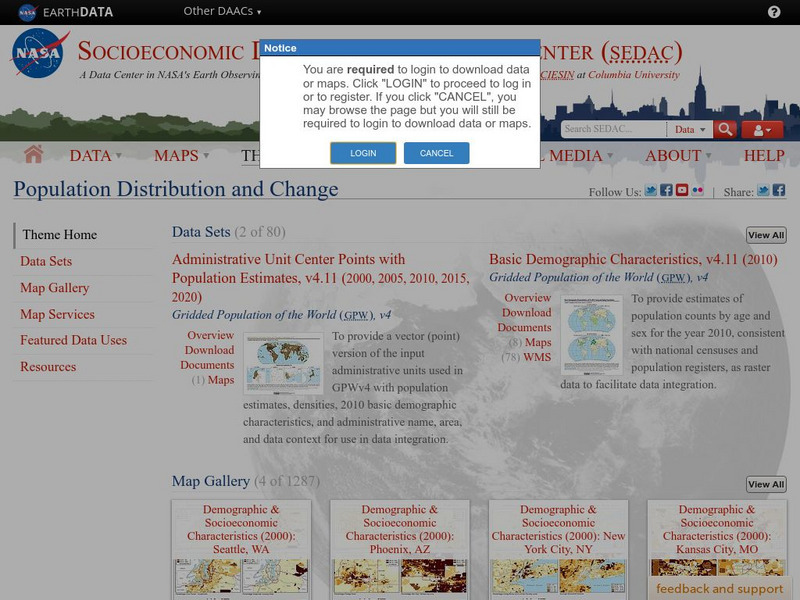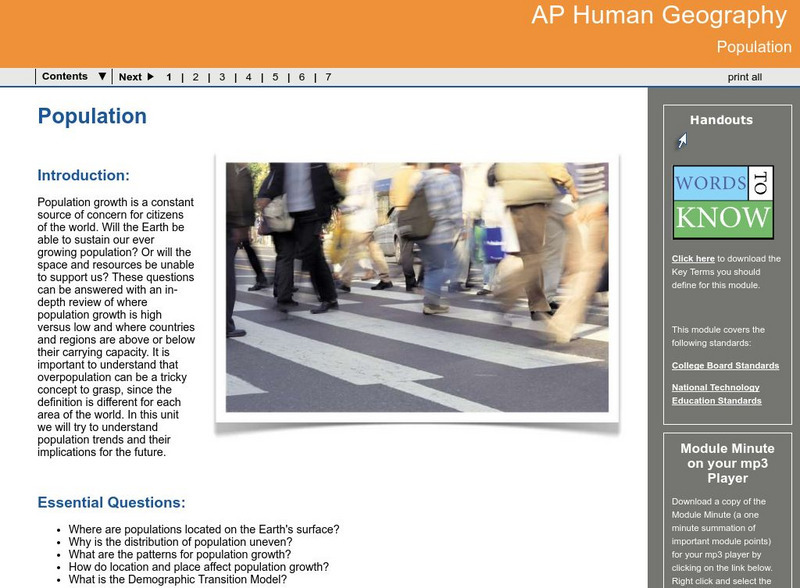Hi, what do you want to do?
Curated OER
Field Of Beans
High schoolers investigate the concept of crop farming. They plant small fields to test different theories of agriculture. Students keep care over the fields, including pest and weed control. High schoolers make and record daily...
Curated OER
What is Migration
Students conduct individual research and participate in discussion be able to identify difference between forced and voluntary migration. They identify if push and pull factors are caused by political, social, economic, or environmental...
Curated OER
Cloning and Related Issues
Eighth graders research information on cloning and the surrounding issues online. They analyze the issues surrounding cloning and present their point of view with supporting details in a Powerpoint presentation.
Curated OER
East to West: Africa's Influence on Mexico
Your historians and social anthropologists study the relationship between peoples of ancient Africa and ancient Mesoamerica. They relate in written or verbal form the African presence in the ancient Americas. They create their own...
Curated OER
Immigration Push and Pull Factors
Eighth graders examine significant ideas, beliefs, and themes; organize patterns and events; and analyze how individuals and societies have changed over time in Maryland, the United States, and the world.
Curated OER
Classroom Census
Students take a classroom census. They count in sets, sortan classify groups and ascertain the value of counting.
Curated OER
Most Troublesome Exotic Invasive Plant Species Web Quest
Young scholars participate in a Web Quest activity in which they identify common exotic invasive plant species of the Southern Appalachian Region. After identifying the top 10 exotic invasive species, they choose one to research in depth.
Curated OER
Water Quality Monitoring
Students comprehend the four parameters of water quality. They perform tests for salinity, dissolved oxygen, pH and clarity or turbidity. Students comprehend why scientists and environmental managers monitor water uality and aquatic...
Curated OER
Average Vehicle Occupancy In Your Community
Students determine the average vehicle occupancy in their community. For this transportation lesson students develop and analyze a survey to determine attitudes towards air pollution and transportation.
Curated OER
Exploring Air Issues
Pupils collects survey data from their community on air pollution. In this environmental science instructional activity, students consider the opinion of the community on air pollution and create a plan to reduce it. Pupils plan on...
Curated OER
Change by Chance?
Sixth graders are able to see the role of chance in evolution. The activity is similar to the party game "gossip" or "telephone." Students start off with a drawing of an animal which changes as they pass their copies of the animal to...
Columbia University
Nasa: Sedac: Population Distribution and Change
[Free Registration/Login Required] A collection of forty-nine data sets from SEDAC (Socioeconomic Data and Applications Center) that examine the distribution of human populations around the world and the changes that have taken place in...
Other
America's Civil War: Population Distribution of the Future Confederate States
Provides information on the 1860 Population distribution of the the eleven future Confederate states after the Civil War.
US Census Bureau
Population Pyramids
Visual representations of population distribution by age and sex for any country.
Geographypods
Geographypods: Theme 1: Population and Settlement
A rich collection of highly engaging learning modules on topics related to population and settlement. Covers six main areas - population growth, population change, population migration, land use, settlement characteristics and patterns,...
National Geographic
National Geographic: Population Density in the United States
Several factors contribute to the population trends across the United States. This lesson will explore maps to discover and understand these trends.
Other
Population
Population directly effects our everyday lives in many ways. Explore the effects of population by learning about population density, population distribution, and population change.
US Census Bureau
U.s. Census Bureau: Population Change and Distribution [Pdf]
This U.S. Census Web site gives current and past information on population changes and distribution. Must have an Adobe Reader to access.
CK-12 Foundation
Ck 12: Episd: Population Size, Density, and Distribution
[Free Registration/Login may be required to access all resource tools.] Students will identify and understand the significance of size, density and distribution in the population of organisms.
US Census Bureau
Us Census Bureau: Population Pyramid Graph for Canada
Graphs showing the population pyramids of Canada from the year 2018. Shows a comparison of males versus females.
CK-12 Foundation
Ck 12: Biology: Population Size, Density, and Distribution
[Free Registration/Login may be required to access all resource tools.] Overview of population size, density, and distribution.
Missouri State University
Missouri State University: Introductory Statistics: The Sampling Distribution
A review is provided at the start of this resource, then the more specific discussion of sampling distributions gets under way. Graphs are provided for ease in understanding the material.
Science Education Resource Center at Carleton College
Serc: Simple Population Space Usage
Using data on population, land area, and house size, students will investigate how much space is used by people in Texas compared to the population of the world, and how much space would be required to give everyone in the world the...
Georgia Department of Education
Ga Virtual Learning: Ap Human Geography: Population
Learning module for AP Human Geography course explores population, including factors affecting distribution and growth.


























